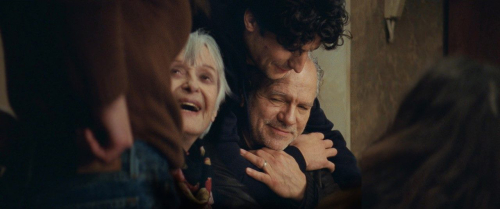
Benjamin Baltimore
MOVIE REVIEW
The Plough (2023)
A movie about three generations of a family running their own puppet theater in Paris is an unusual setting for exploring how a person chooses their life. Of course the multiple metaphors, starting with the title, play their part, but so do family expectations, the limits of the body, and who a person falls in love with. Philippe Garrel won the Best Director prize at this year’s Berlinale for his work, a startling choice since there’s nothing overtly flashy here, which is the entire point.
Simon (Aurélien Recoing) is a widower and the proprietor of the children’s puppet theater, Le grand chariot, which operates from a building in the garden of the family’s comfortable home. It is primarily staffed by his children, Louis (Louis Garrel), Martha (Esther Garrel) and Lena (Lena Garrel; yes, the real-life children of the director), who all also happily live in the house with Simon’s mother Gabrielle (Francine Bergé), who mends the puppets and does the housekeeping. But no one is getting any younger; and Lena’s arm was injured by the police at a topless protest (“Weren’t you cold?” is Gabrielle’s only comment), so the reinforcements have been brought in: acting student Laure (Asma Messaoudene) and Louis’s best friend Pieter (Damien Mongin). Pieter has integrated so well with the team Simon decides to offer him a permanent, full-time job. Pieter, a broke-ass painter from a broken home, is delighted to accept. Therefore he now has only one problem: He has fallen in love with Laure, which necessitates an awkward breakup with Hélène (Mathilde Weil), who is about to have his baby.
The contrast of Pieter’s haplessness – when he goes to register the birth, he has to call Hélène to be reminded of the baby’s name – with how the family and theater have stayed together over the decades makes its own point. Simon’s creation of the old-fashioned puppet show was the politicized protest of a radical unhappy with the commercialization of the arts in France; and his kids have been brought up to see the preservation of ancient artistic traditions as political a choice as making the papers for being arrested in the street with your boobies out. The shows themselves, for an audience of wide-eyed little kids and their less delighted mothers, offer a running commentary on the family’s preoccupations as metaphorical as any surgery on “Grey’s Anatomy.” These people are kind, supportive, intellectual and fiercely proud of their ability to thrive on their own terms; when Gabrielle casually mentions she and her sisters all falsified their official immigration paperwork to shave five years off their ages, Martha’s only surprise is that she didn’t already know. But nothing lasts forever; and when some upsetting things happen to the family and Pieter in close succession, some difficult decisions are required.
Philippe Garrel has so expertly sugared the pill the directing award is well deserved. Pieter’s fumbling bumbling is only treated with compassion, even from Hélène. There’s no lack of personal responsibility here, but not everyone is as fortunate as Simon (or the Garrels, apparently) in knowing exactly what they want and how to get it. One plot twist can only be described as French, too. The metaphors of “The Plough” only grow as they are considered. It might not look like a radical film, but it really is, since a happy family is an amazing achievement, and the ability to address the newest topics in the oldest ways is a skill to be treasured.
Comments